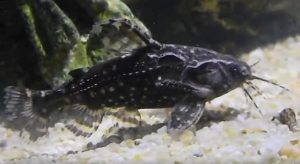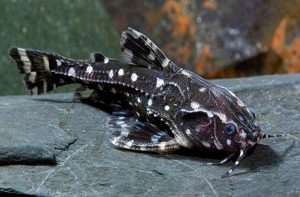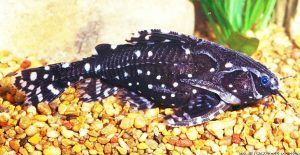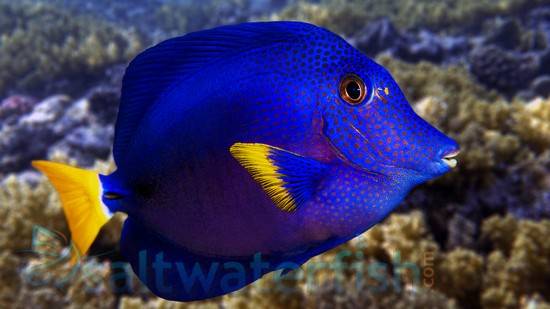The Spotted Raphael Catfish (Agamyxis pectinifrons) is also known to tropical fish keeping enthusiasts as the Spotted Talking Catfish, Spotted Raphael, White Spotted Catfish, White Barred Catfish, or Talking Catfish and is found in Brazil, Peru, Columbia, and Bolivia in the Amazon River basin.
Spotted Raphael Catfish (Agamyxis pectinifrons) are a gregarious nocturnal species that prefer living in slower moving waters with little to no current and plenty of aquatic vegetation and bogwood where they hide during daylight hours. When active, they are peaceful, curious, naturally inquisitive, and full of personality.
The Spotted Raphael Catfish is known to be a burrowing fish that in its natural habitat prefers sandy bottoms where it feeds on worms, crustaceans, mollusks, and organic bottom debris.
Agamyxis pectinifrons has a curious tadpole like body shape with a large head, small eyes, and an impressive set of dagger like pectoral and dorsal spines. It has a dark brown to blue black body color with an irregular pattern of spots on the back, sides, and fins that can be either pale yellow or white. Mature females are noticeably fuller bodied than males.
In appearance, Agamyxis pectinifrons is very similar to Agamyxis albomaculatus which is known only from the Río Orinoco drainage in Venezuela. Both species are regularly sold under the same trade names.
Like other members of the Doradidae family of armored catfish, Spotted Raphael Catfish are “talkers” and produce a guttural type of croak or a series of squeaks when threatened or when they want to intimidate other fish.
Spotted Raphael Catfish can be housed in a blackwater type biotope system in groups of 5 or 6 of their own kind or in a medium to large community tank environment with other peaceful Amazonian species. Compatible tank mates include cichlids, characins, tetras, and other smaller size catfish. Dark black specimens with pure white spots make an especially impressive addition to any South American tank.
Agamyxis pectinifrons is best kept in a densely planted, dimly lit aquarium of at least 55 gallon capacity with a sand or fine gravel substrate, some driftwood tangles, and either artificial caves or rocks formed into caves for them to hide during daylight hours. Floating plants
like duckweed, water lettuce, or Water Hyacinth
can be used to diffuse overhead lighting.
These fish get along well with both peaceful fish and larger more aggressive species in a well aquascaped tank with plenty of hiding places.
Although Spotted Raphael Catfish can live in a variety of water conditions, they should be provided with a good filtration system and regular water changes.
The Spotted Raphael Catfish has not been bred naturally in an aquarium environment. They have been bred using hormones to artificially induce spawning.
Spotted Raphael Catfish are omnivorous and will accept almost any live, commercially prepared flake, pellet, freeze dried or frozen food. A varied diet consisting of a good quality sinking pellet or wafer supplemented with live or frozen tubifex, bloodworms
, earthworms
, mosquito larvae, etc. will provide the necessary protein.
Spotted Raphael Catfish (Agamyxis pectinifrons) are available for purchases at reasonable prices from most tropical fish shops when they are anywhere from 2″ to 3″ in length.
Minimum Tank Size: 55 gallons
Care Level: Easy
Temperament: Peaceful
Aquarium Hardiness: Hardy
Water Conditions: 71 – 19, H 18-357, pH 5.5-7.5
Max. Size: 6″
Color Form: Brown, Black, White
Diet: Omnivore
Compatibility: Good community tank fish
Origin: Brazil, Peru, Columbia, Bolivia
Family: Doradidae
Live Span: 5 to 20 years
Aquarist Experience Level: Beginner





